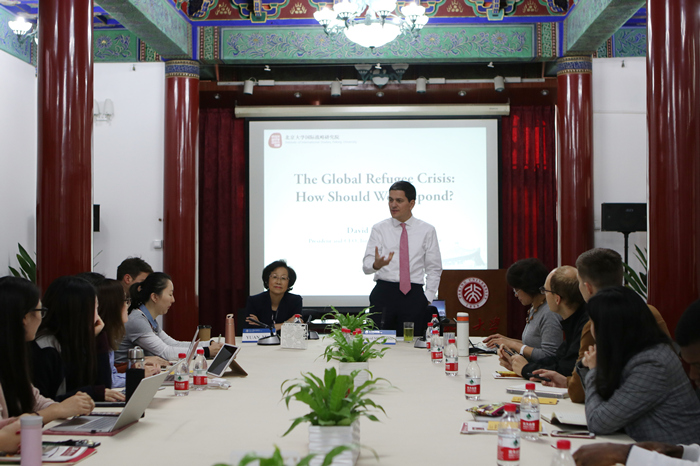
On the afternoon of October 23rd, 2018, Mr. David Miliband, former British Foreign Secretary, President and CEO of the International Rescue Committee (IRC), attended the 5th“North Pavilion Dialogue” of Peking University (PKU) upon invitation, and delivered a speech entitled “The Global Refugee Crisis: How Should We Respond?” at the North Pavilion of PKU. Over 40 faculty members and students from PKU attended this lecture, including Liu Haifang, Associate Professor of School of International Studies, PKU, along with more than 10 scholars from the Yenching Academy of PKU. The lecture was hosted by Prof. Yuan Ming, Vice President of the Institute of International and Strategic Studies (IISS), PKU.
Mr. Miliband first gave a brief introduction into the definition of refugees, the current state of the global refugee crisis and the history of the development of refugee status. He emphasized that a better understanding of the refugee crisis not only involves the knowledge of the total number of refugees and the scale of the crisis, but more importantly, the understanding of the nature and new features of the “forced displacement” of refugees. First, in recent years, the displacement of refugee groups is no longer a short-term migration process, but rather a long-term, manoeuvred and forced migration process. Second, more than 60% of the refugee groups do not live in refugee camps, but rather reside in suburban and rural areas, which leaves them with limited access to direct international assistance. At the same time, the vast majority of refugees live in countries with low levels of development. More than half of the displaced population is children, and most of them do not have access to basic education.
Next, Mr. Miliband carefully analyzed the causes of, and possible solutions to the global refugee crisis. The refugee crisis is closely related to the lack of legitimacy in the power-sharing of some national politics, the polarization of the international system, the instability in the Islamic world, and the potential groups subject to forced migrations in the future due to climate change. The refugee crisis is not a short-term crisis, but is rather a long-term issue for the whole international community. The only real solution to this problem is the cessation of political and military conflicts and hostilities. In terms of the humanitarian assistance from the international community, however, the previous short-term relief, along with the old model of humanitarian assistance aiming at maintaining the survival of people, needs to be adjusted. The real effective measure to deal with today’s refugee crisis is to implement a new pattern of behaviors featuring the following steps:
1. Replacing the material distribution by providing sufficient financial aid. This is a more precise and effective approach that can promote the development of the local economy, increase the income of local people, and reduce the conflicts between refugees and local people. In particular, this approach can also reduce the possibility of women being victimized.
2. Allow refugees to find employment. Relevant international organizations can also work with the local government to develop large-scale economic development projects and expand employment.
3. Focus on children’s education and mental health.
4. Provide more resettlement opportunities in a third country for the most vulnerable refugee groups.
Mr. Miliband believed that the international assistance to refugees represents the provision of global public goods, and is a shared responsibility of the international community, and that the refugee crisis is a long-term common and global issue for the whole international community. In the final discussion session, Mr. Miliband held in-depth exchanges and discussions with all the faculty members and students on a series of topics, including the relations between refugees and the local population, financial supervision of relevant international organizations and political solutions to refugee issues.

